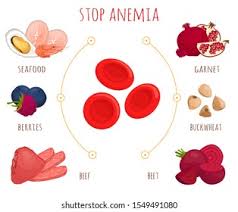
Anemia Symptoms & Treatement

Because a low red blood cell count decreases oxygen delivery to every tissue in the body, anemia can cause a variety of signs and symptoms. It can also worsen the symptoms of almost any other underlying medical condition. If anemia is mild, it may not cause any symptoms. If anemia is slowly ongoing (chronic), the body may adapt and compensate for the change; in this case there may not be any symptoms until the anemia becomes more severe.
Symptoms of anemia may include the following:
• Fatigue
decreased energy
• weakness
• shortness of breath
• lightheadedness
• palpitations (feeling of the heart racing or beating irregularly)
• looking pale.
Symptoms of severe anemia may include:
• chest pain, angina, or heart attack
• dizziness
• fainting or passing out
• rapid heart rate
Some of the signs that may indicate anemia in an individual may include:
Treatment of anemia
Treating anemia entails treating the condition of low hemoglobin and red blood cells in blood as well as detecting and treating the disease process that has led to the anemia. Unless the underlying cause of anemia, which may be continuous blood loss, hemolytic anemia, iron deficiency or increased demand states like pregnancy, are assessed and managed, the treatment remains incomplete.
Anemia treatment depends on the cause.
• Iron deficiency anemia :
Treatment for this form of anemia usually involves taking iron supplements and making changes to your diet. If the underlying cause of iron deficiency is loss of blood other than from menstruation the source of the bleeding must be located and stopped. This may involve surgery.
• Vitamin deficiency anemia :
Treatment for folic acid and B-12 deficiency involves dietary supplements and increasing these nutrients in your diet. If your digestive system has trouble absorbing vitamin B-12 from the food you eat, you may need vitamin B-12 shots. At first, you may receive the shots every other day. Eventually, you will need shots just once a month, which may continue for life, depending on your situation.
• Anemia of chronic disease:
There is no specific treatment for this type of anemia. Doctors focus on treating the underlying disease. If symptoms become severe, a blood transfusion or injections of synthetic erythropoietin, a hormone normally produced by your kidneys, may help stimulate red blood cell production and ease fatigue.
• Aplastic anemia :
Treatment for this anemia may include blood transfusions to boost levels of red blood cells. You may need a bone marrow transplant if your bone marrow is diseased and can not make healthy blood cells.
• Anemia associated with bone marrow disease :
Treatment of these various diseases can include medication, chemotherapy or bone marrow transplantation.
• Hemolytic anemia :
Managing hemolytic anemia includes avoiding suspect medications, treating related infections and taking drugs that suppress your immune system, which may be attacking your red blood cells. Depending on the severity of your anemia, a blood transfusion or plasmapheresis may be necessary.


